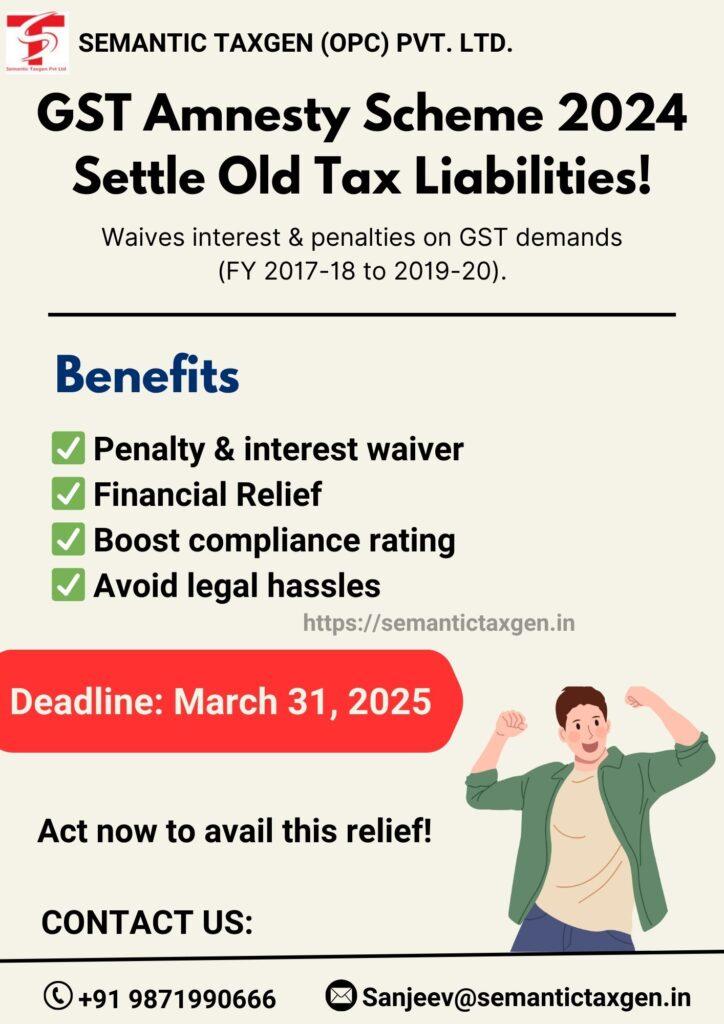
GST Amnesty Scheme 2024: The introduction of Section 128A in the Central Goods and Services Tax (CGST) Act marks a significant step towards easing tax compliance for businesses. Proposed during the 53rd GST Council Meeting, this section aims to provide conditional waivers of interest and penalties for specified tax periods. This scheme is popularly referred to as the GST Amnesty Scheme 2024.
Let’s dive into the key details, including eligibility, procedure, and important dates.
The GST Amnesty Scheme is introduced to provide relief to taxpayers who have not filed their returns on time or have made errors in compliance. The scheme aims to promote voluntary compliance by waiving or reducing penalties for defaulters.
The GST Amnesty Scheme, formalized under Section 128A of the CGST Act, was introduced via the Finance (No. 2) Act, 2024, and became effective from November 1, 2024, as per Notification No. 17/2024-Central Tax. This scheme offers relief by waiving off interest and penalties related to tax demands for FY 2017-18 to FY 2019-20, provided certain conditions are met.
To qualify for the scheme, taxpayers must meet the following conditions:
Certain cases are explicitly excluded:
In the 54th GST Council Meeting, further procedural clarifications were recommended. These were formalized via Notification No. 20/2024-Central Tax and Notification No. 21/2024-Central Tax, both dated October 8, 2024. The notifications provide a detailed framework under Rule 164 of the CGST Rules, 2017.
S NO. | Process | Form | Rule | Comments/Important Instructions |
1. | Application Under Section 128A (1) (a) | GST SPL O1 | 164 (1) | 1. This form is used to apply for an exemption where one receives a notice or Statement The author does not believe that any such pending SCNs/Statements u/s 73 for the period 01.07.2017 to 31.03.2020 will be possible as the same would have expired time-barred much earlier than 01.011.2024 in any case; except when the notice refers to notice mentioned in Proviso of ss.128 (1), or when notice already issued is stayed for adjudication under some court order. 2. The documents and proofs that need to be submitted are listed on table 7 of the GST SPL01. The form contains clear instructions of how to file the form. |
2. | Application Under Section 128A (1) (b) or (1) (c | GST SPL 02 | 164 (2) | 1. This form is for waiver applications where a demand order or order in appeal has been passed. 2. Table 7 of the GST SPL01 provides the documents and proofs required to be submitted. There are detailed instructions for filing in the form itself. |
The GST Amnesty Scheme under Section 128A offers a crucial opportunity for taxpayers to settle old tax disputes with reduced penalties and interest. Businesses should leverage this scheme to clear outstanding liabilities while ensuring compliance with procedural requirements.
With the deadline set for March 31, 2025, it’s advisable to act promptly to benefit from the conditional waivers. Stay tuned for the official circular to gain more clarity on the implementation process.
Any taxpayer with tax demands under Section 73for FY 2017-18 to FY 2019-20 can apply, subject to fulfilling eligibility conditions.
Taxpayers must pay the full tax amount by March 31, 2025.
No, cases involving fraud or misrepresentation under Section 74are excluded.
© 2013-25 Semantic Taxgen Pvt Ltd - All Rights Reserved